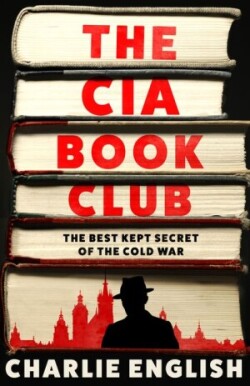Charlie English presents a counter-narrative to common understandings of the Central Intelligence Agency.
A required reading for anyone seeking a new perspective on American cultural leadership.
The CIA Book Club
The CIA Book Club: The Best Kept Secret of the Cold War
The CIA. The acronym that launched a million undergraduate essays on the evils of American foreign policy after 1945 and a thousand Hollywood films that revel in the glamour of it all. The CIA. The shadowy machine that subverted and brought down elected governments in the Middle East and Latin America so that the USA could extend its modern brand of informal imperialism. The archetypical ‘deep state’ universe of spooks and secrets and surveillance that critics from both Left and Right vilify. The macho world of ‘special operations’ in enemy territory carried out by elite corps of mavericks in dark glasses.
And it also had a book club.
Charlie English’s new book, The CIA Book Club, offers a counter-narrative to common understandings of the Central Intelligence Agency. English contends that ‘The Best Kept Secret of the Cold War’ was the CIA’s secret project to supply Iron Curtain populations with literature or the means to produce literature independently of the Soviet Union-backed local Communist governments. It is an absorbing and timely contribution to the public understanding of the Cold War and US relations with Central and Eastern Europe at a crucial moment in world history.
Author Charlie English is a former Guardian journalist who has already written several non-fiction books which reveal an eye for telling detail and an impressive ability to vividly evoke the everyday reality of lost worlds. In The CIA Book Club, English deals with Poland in the late 1970s and 1980s, conjuring up the lost world of Communist rule and the dissidents who ran horrendous risks to oppose it. The book centres on the efforts of Polish intellectuals and activists to access and produce the printed word, and it reveals the extent to which the CIA catered to this demand as a means of undermining the Communist Party’s grip on the hearts and minds of the Polish people. This all took place within the context of pivotal Polish and Cold War moments - particularly the Solidarity breakthrough in 1980 and the subsequent regime crackdown on opposition and free speech. The key argument throughout is that the flow of literature from West to East, as well as printing materials and money, sustained the cause of liberty in Poland during some of its darkest moments and thus played an unheralded role in the democratic revolution at the end of the 1980s.

CIA Book Club
English CharlieThe book reveals fascinating detail regarding the methods employed by Poles and the CIA to make the ‘book club’ work. Unsurprisingly, the CIA preferred to operate through ostensibly independent philanthropic organisations, such as the New York-based International Literary Centre, which dealt with the logistics of supplying Poland with illegal books. Meanwhile, in Poland, dissidents improvised and ultimately perfected a range of strategies to carry out their subversive work without being penetrated by the authorities. English describes the work of women like Joanna Szczęsna:
"Assuming they were followed whenever they were outside, they made up cover stories to go with their false IDs, and when they met they were ready to hide everything at a moment’s notice. There was a perpetual risk of eavesdropping: planting bugs was a favourite Uzbek [state security] tactic. But the women also knew that if they avoided all incriminating exchanges they wouldn’t be able to do any work, so they would talk loudly and quickly for the benefit of the hidden microphones while writing sensitive information – addresses, appointments and the like – on scraps of paper which they burned afterwards with a candle."
The story involves also looking beyond America and Poland: Malmö and the Baltic Sea crossing, the Frankfurt Book Fair and the Polish émigré capital at Paris all served as crucial points of cultural contact between dissidents and the West. English tells his story well: moving briskly and showing empathy as well as expertise.
Charlie English’s book is important and timely for many reasons. Its rich findings on Poland will surely stimulate similar studies on comparable countries such as Czechoslovakia (and it is a minor gripe that the title of the book fails to convey the author’s single-country focus). The book also presents us with an unexpectedly positive view of the Central Intelligence Agency. Having read this book, few would disagree that, at least in the case of 1980s-Poland, the CIA was on the side of the angels. Not only does this narrative offer a partial corrective to the Liberal-Left view of the CIA as enabler of the American Empire, it also challenges the Liberal-Right view – currently espoused with devastating effect by the Trump administration – that defending democracy and liberalism abroad is not in the USA’s national interest (witness the recent cancellation of funding for Radio Free Europe).
At a time in which the tectonic plates of international relations are shifting fundamentally, The CIA Book Club is required reading for anyone seeking a new perspective on American cultural leadership and how it can affect the wider world.



















